29 mar 2018
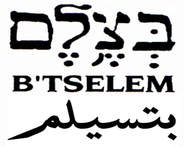
B’Tselem – The Israeli Information Center for Human Rights In The Occupied Territories: Ahead of the Palestinian demonstrations planned to start tomorrow (Friday) in Gaza, Israeli officials have repeatedly threatened to respond with lethal force.
Completely ignoring the humanitarian disaster in Gaza and Israel’s responsibility for it, they are couching the planned protest in terms of a security risk, framing the demonstrators as terrorists and referring to Gaza as a “combat zone”.
Fragments of information reported by the media indicate that: soldiers will be ordered to shoot anyone coming within 300 meters of the fence; snipers will fire at anyone touching it; live fire will be used also in circumstances which are non-life-threatening. In other words: shoot-to-kill unarmed Palestinians taking part in these demonstrations.
Israeli forces have already been lethally shooting Palestinian demonstrators in Gaza for some time. In December 2017 alone – the most lethal month in the last year – Israeli forces shot and killed eight unarmed Palestinian demonstrators in Gaza.
Expanding this unlawful use of live fire will undoubtedly raise the death toll. Yet this predictable outcome appears not to have affected Israeli decision-making regarding the response to demonstrations in Gaza, both in general and specifically in formulating the open-fire orders.
Further, Israel’s presumption that it can dictate the actions of Palestinians inside the Gaza Strip is absurd. The decision where and whether and how to demonstrate in Gaza is not Israel’s to make – not with regard to tomorrow’s demonstrations nor in general with regard to daily life.
Official Israeli statements have made no reference to the actual reason for the protest – the disastrous reality in Gaza – or to the right to free protest.
Israel has the power to immediately change life in Gaza for the better, but has chosen not to do so. It has made Gaza a huge prison, yet forbids the prisoners even to protest against this, on pain of death.
Completely ignoring the humanitarian disaster in Gaza and Israel’s responsibility for it, they are couching the planned protest in terms of a security risk, framing the demonstrators as terrorists and referring to Gaza as a “combat zone”.
Fragments of information reported by the media indicate that: soldiers will be ordered to shoot anyone coming within 300 meters of the fence; snipers will fire at anyone touching it; live fire will be used also in circumstances which are non-life-threatening. In other words: shoot-to-kill unarmed Palestinians taking part in these demonstrations.
Israeli forces have already been lethally shooting Palestinian demonstrators in Gaza for some time. In December 2017 alone – the most lethal month in the last year – Israeli forces shot and killed eight unarmed Palestinian demonstrators in Gaza.
Expanding this unlawful use of live fire will undoubtedly raise the death toll. Yet this predictable outcome appears not to have affected Israeli decision-making regarding the response to demonstrations in Gaza, both in general and specifically in formulating the open-fire orders.
Further, Israel’s presumption that it can dictate the actions of Palestinians inside the Gaza Strip is absurd. The decision where and whether and how to demonstrate in Gaza is not Israel’s to make – not with regard to tomorrow’s demonstrations nor in general with regard to daily life.
Official Israeli statements have made no reference to the actual reason for the protest – the disastrous reality in Gaza – or to the right to free protest.
Israel has the power to immediately change life in Gaza for the better, but has chosen not to do so. It has made Gaza a huge prison, yet forbids the prisoners even to protest against this, on pain of death.
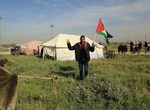
The Israeli ministerial cabinet held a special meeting Wednesday to discuss the expected mass Palestinian protests, especially in the Gaza Strip, this Friday to commemorate Palestinian Land Day.
The Cabinet decided to significantly increase military deployments, in addition to using live fire and shoot to kill orders “if the Palestinians breach (or approach) the security fence” in the besieged coastal territory.
The Israeli preparations also include various parts of the occupied West Bank, especially in areas close to its illegal colonies and military bases. Israeli officials have publicly stated that Israeli colonial settlers will be urged to carry their weapons in the area around the protests – despite these settlers having a documented history of excessive violence against Palestinian civilians.
The Israeli army said that its soldiers will use live ammunition, even if it means serious casualties among the Palestinians “should they approach or breach the border fence” in Gaza.
Israeli daily Haaretz said the military has called up snipers and additional units to counter the Palestinian protesters this coming Friday, and added that “military officials are certain the army will be able to prevent the Palestinians from crossing the Gaza border.”
The Israeli Energy Minister, a member of the Likud Party, Yuval Steinitz even proposed that the army should parachute food and medicine over the besieged and impoverished Gaza Strip, “to tempt the Palestinians away from the protests.”
Although the idea was ridiculed by others in the Cabinet, Palestinian commentators have noted that this proposal reveals Israel’s inability to counter unarmed processions – as well as acknowledging the desperation of the population of Gaza due to the decade-long Israeli siege.
The Maan News Agency has reported that senior Israeli military leaders, and Civil Administration officials in the Occupied Territories, have been threatening the Palestinian protest organizers, and mobilizing a massive show of military force.
In addition, hundreds of additional soldiers have been deployed near border areas and around various communities in the occupied West Bank, especially in occupied Jerusalem.
Israeli sources said the army has decided to deploy additional battalions and Border Police Units in addition to dozens of snipers along the border on Friday, with the stated objective of “preventing the Palestinians from crossing the fence.”
The protests, which will start on Land Day on Friday March 30th, are expected to continue until May 15th, a day marked by the Palestinians as the Nakba (Catastrophe) Day 70 years ago, in 1948, when historic Palestine fell under Israeli occupation.
This is the date that the state of Israel was established after hundreds of villages, and towns, were destroyed and depopulated, and hundreds of thousands of Palestinians were displaced, creating the largest and longest-lasting refugee population on earth.
Amer Shreiteh, a member of the Coordination Committee of the “Great Return March, said the protests would take off from five areas in the Gaza Strip, starting Friday at ten in the morning from the tents that were installed in Rafah, Khan Younis, Central District, Northern District and near Beit Hanoun (Erez) Terminal.
e added that protests would be unarmed, nonviolent, and that the Palestinians are demanding the internationally guaranteed Right of Return of all refugees, as stated in Article 4 of UN Resolution #194.
Shreiteh stated that the United Nations has affirmed this right 130 times, and that the protesters will gradually and nonviolently march towards the border fence.
He said that the Palestinians are not seeking confrontation, and will be nonviolent, parallel with many processions will also be held across the West Bank, and various countries, especially in Lebanon.
“There are 1.300.000 refugees living in very difficult conditions, and extreme poverty in the Gaza Strip alone,” Shreiteh stated, “We want our rights; we want to return, we want the implementation of International Law.”
It is worth mentioning that the committee said that the protests in Gaza will be held more than 700 meters away from the border fence, which is even a larger distance than the restriction zones declared by the army.
The Cabinet decided to significantly increase military deployments, in addition to using live fire and shoot to kill orders “if the Palestinians breach (or approach) the security fence” in the besieged coastal territory.
The Israeli preparations also include various parts of the occupied West Bank, especially in areas close to its illegal colonies and military bases. Israeli officials have publicly stated that Israeli colonial settlers will be urged to carry their weapons in the area around the protests – despite these settlers having a documented history of excessive violence against Palestinian civilians.
The Israeli army said that its soldiers will use live ammunition, even if it means serious casualties among the Palestinians “should they approach or breach the border fence” in Gaza.
Israeli daily Haaretz said the military has called up snipers and additional units to counter the Palestinian protesters this coming Friday, and added that “military officials are certain the army will be able to prevent the Palestinians from crossing the Gaza border.”
The Israeli Energy Minister, a member of the Likud Party, Yuval Steinitz even proposed that the army should parachute food and medicine over the besieged and impoverished Gaza Strip, “to tempt the Palestinians away from the protests.”
Although the idea was ridiculed by others in the Cabinet, Palestinian commentators have noted that this proposal reveals Israel’s inability to counter unarmed processions – as well as acknowledging the desperation of the population of Gaza due to the decade-long Israeli siege.
The Maan News Agency has reported that senior Israeli military leaders, and Civil Administration officials in the Occupied Territories, have been threatening the Palestinian protest organizers, and mobilizing a massive show of military force.
In addition, hundreds of additional soldiers have been deployed near border areas and around various communities in the occupied West Bank, especially in occupied Jerusalem.
Israeli sources said the army has decided to deploy additional battalions and Border Police Units in addition to dozens of snipers along the border on Friday, with the stated objective of “preventing the Palestinians from crossing the fence.”
The protests, which will start on Land Day on Friday March 30th, are expected to continue until May 15th, a day marked by the Palestinians as the Nakba (Catastrophe) Day 70 years ago, in 1948, when historic Palestine fell under Israeli occupation.
This is the date that the state of Israel was established after hundreds of villages, and towns, were destroyed and depopulated, and hundreds of thousands of Palestinians were displaced, creating the largest and longest-lasting refugee population on earth.
Amer Shreiteh, a member of the Coordination Committee of the “Great Return March, said the protests would take off from five areas in the Gaza Strip, starting Friday at ten in the morning from the tents that were installed in Rafah, Khan Younis, Central District, Northern District and near Beit Hanoun (Erez) Terminal.
e added that protests would be unarmed, nonviolent, and that the Palestinians are demanding the internationally guaranteed Right of Return of all refugees, as stated in Article 4 of UN Resolution #194.
Shreiteh stated that the United Nations has affirmed this right 130 times, and that the protesters will gradually and nonviolently march towards the border fence.
He said that the Palestinians are not seeking confrontation, and will be nonviolent, parallel with many processions will also be held across the West Bank, and various countries, especially in Lebanon.
“There are 1.300.000 refugees living in very difficult conditions, and extreme poverty in the Gaza Strip alone,” Shreiteh stated, “We want our rights; we want to return, we want the implementation of International Law.”
It is worth mentioning that the committee said that the protests in Gaza will be held more than 700 meters away from the border fence, which is even a larger distance than the restriction zones declared by the army.
28 mar 2018
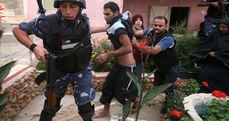
'If lives are in jeopardy, there is permission to open fire,' says Israel's top general as Palestinians prepare for mass demonstration in border area
The Israeli military has sent more than 100 snipers to the Gaza border in preparation for a planned mass Palestinian demonstration near the frontier of the besieged enclave, Israel's top general said on Wednesday.
Organisers hope thousands in Gaza will answer their call to flock, starting on Friday, to tent cities in five locations along the occupied border in a six-week protest for a right of return of Palestinian refugees to what is now Israel.
Citing security concerns, the Israeli military enforces a "no go" zone for Palestinians on land in Gaza adjacent to Israel's border fence.
Lieutenant-General Gadi Eizenkot, the military's chief of staff, told the Yedioth Ahronoth daily that the military would not allow "mass infiltration" or tolerate damage to the barrier during the protests.
"We have deployed more than 100 sharpshooters who were called up from all of the military's units, primarily from the special forces," Eizenkot said in the interview.
"If lives are in jeopardy, there is permission to open fire.
"We won't allow mass infiltration into Israel and to damage the fence, and certainly not to reach the communities."
In response to frequent Palestinian protests along the Gaza border Israeli soldiers have used tear gas, rubber bullets and live ammunition against demonstrators whom the military said hurled rocks or petrol bombs at them.
Organisers said the protest is supported by several Palestinian factions, including Gaza's dominant Hamas movement, which has ruled the strip since Israel imposed an economic blockade in 2007.
Israeli cabinet minister Tzachi Hanegbi, speaking on Israel Radio, said Hamas had avoided direct conflict with Israel since the end of the 2014 Gaza war.
But he said that pressure Hamas was now feeling from Israel's destruction of some of its network of attack tunnels near the border, coupled with harsh economic conditions in Gaza, were "a formula for rising tension".
The start of the demonstration was symbolically linked to what Palestinians call "Land Day", which commemorates the six Arab citizens of Israel killed by Israeli security forces in demonstrations in 1976 over land confiscations.
The week-long Jewish holiday of Passover, when Israel heightens security, also begins on Friday.
The Palestinian protest is due to end on 15 May, the anniversary of the "Nakba" or "Catastrophe", and the forced displacement of hundreds of thousands of Palestinians in the conflict which led to the declaration of Israel in 1948.
Palestinians have long demanded that as many as five million of their compatriots be granted the right to return. Israel refuses to grant this condition.
The Israeli military has sent more than 100 snipers to the Gaza border in preparation for a planned mass Palestinian demonstration near the frontier of the besieged enclave, Israel's top general said on Wednesday.
Organisers hope thousands in Gaza will answer their call to flock, starting on Friday, to tent cities in five locations along the occupied border in a six-week protest for a right of return of Palestinian refugees to what is now Israel.
Citing security concerns, the Israeli military enforces a "no go" zone for Palestinians on land in Gaza adjacent to Israel's border fence.
Lieutenant-General Gadi Eizenkot, the military's chief of staff, told the Yedioth Ahronoth daily that the military would not allow "mass infiltration" or tolerate damage to the barrier during the protests.
"We have deployed more than 100 sharpshooters who were called up from all of the military's units, primarily from the special forces," Eizenkot said in the interview.
"If lives are in jeopardy, there is permission to open fire.
"We won't allow mass infiltration into Israel and to damage the fence, and certainly not to reach the communities."
In response to frequent Palestinian protests along the Gaza border Israeli soldiers have used tear gas, rubber bullets and live ammunition against demonstrators whom the military said hurled rocks or petrol bombs at them.
Organisers said the protest is supported by several Palestinian factions, including Gaza's dominant Hamas movement, which has ruled the strip since Israel imposed an economic blockade in 2007.
Israeli cabinet minister Tzachi Hanegbi, speaking on Israel Radio, said Hamas had avoided direct conflict with Israel since the end of the 2014 Gaza war.
But he said that pressure Hamas was now feeling from Israel's destruction of some of its network of attack tunnels near the border, coupled with harsh economic conditions in Gaza, were "a formula for rising tension".
The start of the demonstration was symbolically linked to what Palestinians call "Land Day", which commemorates the six Arab citizens of Israel killed by Israeli security forces in demonstrations in 1976 over land confiscations.
The week-long Jewish holiday of Passover, when Israel heightens security, also begins on Friday.
The Palestinian protest is due to end on 15 May, the anniversary of the "Nakba" or "Catastrophe", and the forced displacement of hundreds of thousands of Palestinians in the conflict which led to the declaration of Israel in 1948.
Palestinians have long demanded that as many as five million of their compatriots be granted the right to return. Israel refuses to grant this condition.

Thousands of Palestinians will march and stage sit-ins at Israeli borders and checkpoints on Friday in an unprecedented mass action campaign, demanding the right to return to homes that they lost when the Israeli state was established in 1948.
“We are tired of waiting, we are returning now. This will be a peaceful march from beginning to end. We shall carry no weapons, we shall shoot no bullets, and throw no stones,” said organizers of the Great Return March (GRM).
Armed with only the flag of Palestine and banners bearing the text of United Nations Resolution 194 that guarantees Palestinian refugees the right to return to their homes, organizers have consistently stressed the peaceful nature of the march.
Israeli Response
In response to the peaceful protest, the Israeli army has deployed extra troops, snipers and drones at checkpoints and border crossings, reported the Middle East Monitor. According to the International Middle East Media Centre, the Israeli army has been placed on high alert. (Note: In regular protests since December, Israeli forces have used lethal violence against Palestinian demonstrators, killing a number of unarmed protesters and injuring hundreds more).
"Sit-in may last for months"
Sit-ins will start in the besieged Gaza Strip and spread to the occupied West Bank, East Jerusalem and within Israel itself. Hundreds of thousands of Palestinian refugees from refugee camps across Jordan, Lebanon and Syria are also expected to participate in the mass action.
“It is a sustained and cumulative struggle, not a seasonal or a one-day event. It will only end with the actual return of Palestinian refugees and the sit-in may last for weeks or months,” the organizing committee said to the Afro-Palestine Newswire Service.
The march also comes at a time when many Palestinians believe there is an Israeli-American plan to liquidate the whole Palestinian cause - a plan that started with US recognition of Jerusalem as the capital of Israel and taking the city’s status off the negotiation table.
“We are tired of waiting, we are returning now. This will be a peaceful march from beginning to end. We shall carry no weapons, we shall shoot no bullets, and throw no stones,” said organizers of the Great Return March (GRM).
Armed with only the flag of Palestine and banners bearing the text of United Nations Resolution 194 that guarantees Palestinian refugees the right to return to their homes, organizers have consistently stressed the peaceful nature of the march.
Israeli Response
In response to the peaceful protest, the Israeli army has deployed extra troops, snipers and drones at checkpoints and border crossings, reported the Middle East Monitor. According to the International Middle East Media Centre, the Israeli army has been placed on high alert. (Note: In regular protests since December, Israeli forces have used lethal violence against Palestinian demonstrators, killing a number of unarmed protesters and injuring hundreds more).
"Sit-in may last for months"
Sit-ins will start in the besieged Gaza Strip and spread to the occupied West Bank, East Jerusalem and within Israel itself. Hundreds of thousands of Palestinian refugees from refugee camps across Jordan, Lebanon and Syria are also expected to participate in the mass action.
“It is a sustained and cumulative struggle, not a seasonal or a one-day event. It will only end with the actual return of Palestinian refugees and the sit-in may last for weeks or months,” the organizing committee said to the Afro-Palestine Newswire Service.
The march also comes at a time when many Palestinians believe there is an Israeli-American plan to liquidate the whole Palestinian cause - a plan that started with US recognition of Jerusalem as the capital of Israel and taking the city’s status off the negotiation table.
27 mar 2018
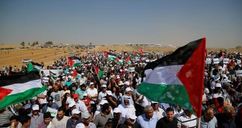
Israel is cooperating with Palestinian Authority, Jordanian and Egyptian security officials with the aim of blocking the march of return planned for Friday to mark the 42nd anniversary of the Land Day, Israeli media sources revealed.
Israel Hayom newspaper said that “Israel, Egypt, Jordan and the Palestinian Authority share concerns that Friday's protest will turn violent and spark riots across the entire region.”
“The PA is said to be concerned that any violence in Gaza will spark riots across the West Bank. Jordan is worried that riots in the West Bank could spill into its territory. Egypt is concerned about riots on its shared border with the Gaza Strip and about the possibility of Palestinian masses breaching the border.”
Palestinian security forces have been instructed to allow solidarity protests in the West Bank, but have been ordered to prevent protesters from going to Israeli checkpoints and clashing with Israeli forces, a Palestinian source said.
A senior Palestinian official told Israel Hayom that while the diplomatic discord between Israel and the Palestinian Authority has made it hard for them to trust each other, security coordination between the Israeli and Palestinian security forces remains professional.
A series of peaceful marches are scheduled to be held on March 30, in commemoration of Land Day.
Israel Hayom newspaper said that “Israel, Egypt, Jordan and the Palestinian Authority share concerns that Friday's protest will turn violent and spark riots across the entire region.”
“The PA is said to be concerned that any violence in Gaza will spark riots across the West Bank. Jordan is worried that riots in the West Bank could spill into its territory. Egypt is concerned about riots on its shared border with the Gaza Strip and about the possibility of Palestinian masses breaching the border.”
Palestinian security forces have been instructed to allow solidarity protests in the West Bank, but have been ordered to prevent protesters from going to Israeli checkpoints and clashing with Israeli forces, a Palestinian source said.
A senior Palestinian official told Israel Hayom that while the diplomatic discord between Israel and the Palestinian Authority has made it hard for them to trust each other, security coordination between the Israeli and Palestinian security forces remains professional.
A series of peaceful marches are scheduled to be held on March 30, in commemoration of Land Day.
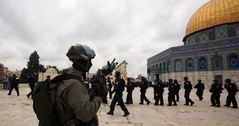
Walla Hebrew website said that hundreds of Israeli policemen on Tuesday started military exercises to storm al-Aqsa Mosque and to turn the Old City of Occupied Jerusalem into a closed military zone.
The Hebrew news website said that the drills which are being held in the border guards police centers with the participation of 700 policemen are aimed at testing the readiness of the police for any “extremist” scenarios including raiding al-Aqsa Mosque.
The exercises are being carried out in light of tension prevailing currently in the West Bank and Gaza Strip in preparation for next Friday on which Palestinian popular massive marches are going to be held to mark the Land Day.
Israeli police will deploy Special Forces, wearing civil clothes, all over the occupied city of Jerusalem in coincidence with the Jewish Passover.
The Hebrew news website said that the drills which are being held in the border guards police centers with the participation of 700 policemen are aimed at testing the readiness of the police for any “extremist” scenarios including raiding al-Aqsa Mosque.
The exercises are being carried out in light of tension prevailing currently in the West Bank and Gaza Strip in preparation for next Friday on which Palestinian popular massive marches are going to be held to mark the Land Day.
Israeli police will deploy Special Forces, wearing civil clothes, all over the occupied city of Jerusalem in coincidence with the Jewish Passover.
26 mar 2018
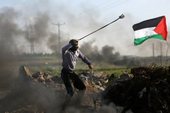
Israeli newspaper Maariv published, on Monday morning, a report on the preparation of the Israeli army and the security establishment to confront the Great March of Return, which is slated to be held on March 30, along the eastern border with Gaza.
The newspaper reported that the army will be on high alert and will deploy several battalions with groups of snipers along the border fence, so as to prevent any breakthrough in the Israeli sovereignty and to curb Palestinian protesters from approaching the fence.
The situation in the Gaza Strip is worsening ahead of this march, while the military wing of Hamas movement, Izz al Din al-Qassam Brigades, has carried out large-scale military maneuvers, which might be connected with the march, according to the newspaper.
It indicated that these maneuvers involved training on attacking Israeli tanks and military vehicles, kidnapping soldiers, and launching rockets in public.
Maariv’s report also noted, according to Al Ray, that Hamas has recently been preparing for the Great Return March, where it placed earthen berms at a distance of 700 meters from the border, to protect protesters from the gunfire of the Israeli army.
Adding to this, the newspaper revealed that the Israeli security establishment has warned against a scenario that hundreds of protesters may break through the fence, which could lead to a new round of escalation in the border areas, indicating that the army is gearing up for such a scenario and for events more hazardous than this.
The report pointed out that the Israeli cabinet discussed, yesterday, the conditions of the Gaza Strip, the Great Return March, and the possibility of erupting a new round of escalation in the Gaza Strip and the West Bank. They reviewed the preparations of the Israeli army and the security establishment in accordance with these expectations.
The newspaper reported that the army will be on high alert and will deploy several battalions with groups of snipers along the border fence, so as to prevent any breakthrough in the Israeli sovereignty and to curb Palestinian protesters from approaching the fence.
The situation in the Gaza Strip is worsening ahead of this march, while the military wing of Hamas movement, Izz al Din al-Qassam Brigades, has carried out large-scale military maneuvers, which might be connected with the march, according to the newspaper.
It indicated that these maneuvers involved training on attacking Israeli tanks and military vehicles, kidnapping soldiers, and launching rockets in public.
Maariv’s report also noted, according to Al Ray, that Hamas has recently been preparing for the Great Return March, where it placed earthen berms at a distance of 700 meters from the border, to protect protesters from the gunfire of the Israeli army.
Adding to this, the newspaper revealed that the Israeli security establishment has warned against a scenario that hundreds of protesters may break through the fence, which could lead to a new round of escalation in the border areas, indicating that the army is gearing up for such a scenario and for events more hazardous than this.
The report pointed out that the Israeli cabinet discussed, yesterday, the conditions of the Gaza Strip, the Great Return March, and the possibility of erupting a new round of escalation in the Gaza Strip and the West Bank. They reviewed the preparations of the Israeli army and the security establishment in accordance with these expectations.
25 mar 2018
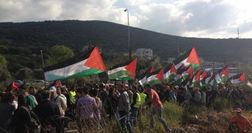
The Palestinian factions in Ramallah have called on Palestinian citizens to actively participate in all activities and events to be organized to commemorate the Land Day and the 70th Nakba anniversary, including the march of return to be staged next Friday.
In a statement, the factions also called for considering March 30 a day for field escalation against the occupation in all areas of Palestine.
They said that a central march of return would take place at the northern entrance to Bireh city on the Land Day following the Friday prayers.
In a statement, the factions also called for considering March 30 a day for field escalation against the occupation in all areas of Palestine.
They said that a central march of return would take place at the northern entrance to Bireh city on the Land Day following the Friday prayers.
15 feb 2018
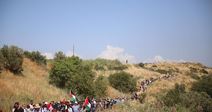
Palestinian national and Islamic factions in the Gaza Strip have agreed to launch a series of events near Gaza's eastern border in the coming days in coordination with the Great March of Return movement.
The leader in the Democratic Front for the Liberation of Palestine, Talal Abu Zarifa, said in an exclusive statement to the PIC that Palestinian factions in Gaza have agreed to organize joint events near the borderline in demand of the right of return for refugees.
Abu Zarifa pointed out that those events will be peaceful and will include the erection of tents, which represent a symbol of the Palestinian right of return, near the border fence.
For his part, the Palestinian official Esam Udwan told the PIC reporter that national factions in Gaza have coordinated with the Great March of Return movement to launch a mass demonstration toward Gaza's border areas on Land Day which falls on 30th March.
The coordinating committee of the Great March of Return said on Monday that Palestinian refugees will start peaceful marches towards the 1948 occupied Palestinian territories in efforts to demand their right of return which was approved by international resolutions.
Youth activists over the past period have been urging Palestinians through different media platforms to participate in the march and defend their right of return to their towns and villages from which they were expelled in 1948.
A group of Gazan citizens have established a camp near the eastern border fence in protest at the siege imposed on Gaza for more than a decade now and in demand of their right of return.
The leader in the Democratic Front for the Liberation of Palestine, Talal Abu Zarifa, said in an exclusive statement to the PIC that Palestinian factions in Gaza have agreed to organize joint events near the borderline in demand of the right of return for refugees.
Abu Zarifa pointed out that those events will be peaceful and will include the erection of tents, which represent a symbol of the Palestinian right of return, near the border fence.
For his part, the Palestinian official Esam Udwan told the PIC reporter that national factions in Gaza have coordinated with the Great March of Return movement to launch a mass demonstration toward Gaza's border areas on Land Day which falls on 30th March.
The coordinating committee of the Great March of Return said on Monday that Palestinian refugees will start peaceful marches towards the 1948 occupied Palestinian territories in efforts to demand their right of return which was approved by international resolutions.
Youth activists over the past period have been urging Palestinians through different media platforms to participate in the march and defend their right of return to their towns and villages from which they were expelled in 1948.
A group of Gazan citizens have established a camp near the eastern border fence in protest at the siege imposed on Gaza for more than a decade now and in demand of their right of return.
Page: 2 - 1
